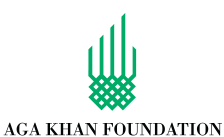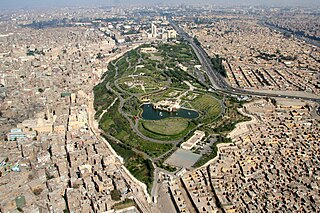
Shah Karim al-Husayni (Arabic: شاه كريم الحسيني, romanized: Shāh Karīm al-Ḥusaynī; born 13 December 1936; known as Aga Khan IV, is the 49th and current imam of Nizari Isma'ilis. He has held the position of Imam and the title of Aga Khan since 11 July, 1957, when, at the age of 20, he succeeded his grandfather, Aga Khan III. The Aga Khan claims direct lineal descent from the Islamic prophet Muhammad through Muhammad's cousin and son-in-law, Ali, who is considered an Imam by Nizari Isma'ilis, and Ali's wife Fatima, Muhammad's daughter from his first marriage. Aga Khan IV is also known by the religious title Mawlānā Hazar Imam by his Isma'ili followers.

The Aga Khan Award for Architecture (AKAA) is an architectural prize established by Aga Khan IV in 1977. It aims to identify and reward architectural concepts that successfully address the needs and aspirations of Muslim societies in the fields of contemporary design, social housing, community development and improvement, restoration, reuse and area conservation, as well as landscape design and improvement of the environment.

Princess Zahra Aga Khan is the eldest child of Aga Khan IV and his first wife, Princess Salimah Aga Khan.

The Aga Khan Development Network (AKDN) is a network of private, non-denominational development agencies founded by the Aga Khan, with the primary focus of improving the quality of life in different regions of Asia and Africa.

The Aga Khan Foundation (AKF) is a private, not-for-profit international development agency, which was founded in 1967 by Shah Karim Al Hussaini, Aga Khan IV, the 49th Hereditary Imam of the Shia Ismaili Muslims. AKF seeks to provide long-term solutions to problems of poverty, hunger, illiteracy and ill health in the poorest parts of South and Central Asia, Eastern and Western Africa, and the Middle East. In these regions, the needs of rural communities in mountainous, coastal and resource poor areas are given particular attention. The Foundation's activities often reinforce the work of other sister agencies within the Aga Khan Development Network (AKDN). While these agencies are guided by different mandates pertaining to their respective fields of expertise, their activities are often coordinated with one another in order to "multiply" the overall effect that the Network has in any given place or community. AKF also collaborates with local, national and international partners in order to bring about sustainable improvements of life in the 14 countries in which it implements programmes. The Foundation's head office is located in Geneva, Switzerland.

Al-Azhar Park is a public park located in qism al-Darb al-Ahmar, in Historic Cairo, Egypt.
Aga Khan Agency for Microfinance (AKAM) is a microfinancing agency of the Aga Khan Development Network.
The Aga Khan Academies is an initiative of the Aga Khan Development Network. When fully operational, the Aga Khan Academies network will consist of eighteen co-educational, K-12, non-denominational day and residential schools in fourteen countries in Africa, South and Central Asia, and the Middle East. The academic program is based on the internationally recognized International Baccalaureate curriculum.
The Aga Khan Health Services is an agency of the Aga Khan Development Network (AKDN) that supports activities in the health field, and manages more than 200 health facilities, including a network of Aga Khan Hospitals.
Aga Khan Education Services (AKES) is one of the agencies of the Aga Khan Development Network (AKDN) supporting activities in the field of education. The others are the Aga Khan Foundation (AKF), the Aga Khan University (AKU), the University of Central Asia (UCA), and the Aga Khan Trust for Culture (AKTC).
Focus Humanitarian Assistance is an international group of agencies established in Europe, North America and South Asia to complement the provision of emergency relief, principally in the developing world. It helps people in need reduce their dependence on humanitarian aid and facilitates their transition to sustainable self-reliant, long-term development.

The Historic Cities Programme (HCP) of the Aga Khan Trust for Culture (AKTC) promotes the conservation and re-use of buildings and public spaces in historic cities of the Muslim world. HCP undertakes the restoration and rehabilitation of historic structures and public spaces in ways that can spur social, economic and cultural development. Individual projects go beyond technical restoration to address the questions of the social and environmental context, adaptive reuse, institutional sustainability and training. In several countries, local Aga Khan Cultural Service companies have been formed to implement projects under the supervision of the HCSP headquarters in Geneva.
In 2020, 97.7% of Indians had access to the basic water and sanitation facilities. India faces challenges ranging from sourcing water for its megacities to its distribution network which is intermittent in rural areas with continuous distribution networks just beginning to emerge. Non-revenue water is a challenge.

Aga Khan Fund for Economic Development SA is a Swiss for-profit entity and international development finance institution which invests in countries of East Africa, West Africa, Central Asia, and South Asia. It is based in Geneva, Switzerland.

Bangladesh is faced with multiple water quality and quantity problems along with regular natural disasters, such as cyclones and floods. Available options for providing safe drinking water include tubewells, traditionally dug wells, treatment of surface water, desalination of groundwater with high salinity levels and rainwater harvesting.
Drinking water supply and sanitation in Pakistan is characterized by some achievements and many challenges. In 2020, 68% Pakistanis, 72% Indians, 54% Bangladeshi had access to the basic sanitation facilities. Despite high population growth the country has increased the share of the population with access to an improved water source from 85% in 1990 to 92% in 2010, although this does not necessarily mean that the water from these sources is safe to drink. The share with access to improved sanitation increased from 27% to 38% during the same period, according to the Joint Monitoring Program for Water Supply and Sanitation. There has also been considerable innovation at the grass-root level, in particular concerning sanitation. The Orangi Pilot Project in Karachi and community-led total sanitation in rural areas are two examples of such innovation.
The Water and Sanitation Extension Program(WASEP) is an initiative by the Aga Khan Planning and Building Service, Pakistan to provide clean drinking water and hygienic sanitation facilities to prevent the high incidence of waterborne diseases in disadvantaged communities of Pakistan.
The Building and Construction Improvement Program(BACIP) is a program of the Aga Khan Planning and Building Service, Pakistan (AKPBS,P) that is engaged in developing and promoting solutions to housing and built environment-related issues of rural communities living in Gilgit-Baltistan and the province of Sindh.
Aga Khan Academy, Hyderabad is an international school in Hyderabad, India. It is located near Rajiv Gandhi International Airport and also Pahadi Shareef.
The Aga Khan Agency for Habitat (AKAH) was established in 2016 and is part of the Aga Khan Development Network (AKDN). It is an umbrella of AKDN agencies and programs that have provided aid and delivered training on habitat and disaster preparedness since the 1990s.








